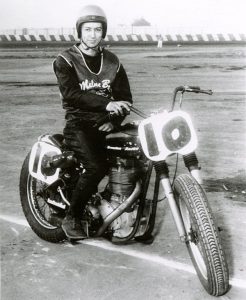AMERICAN MOTORCYCLIST November 2018
Hall Of Famer: Neil Keen

Neil Keen was born in Lakeland, Fla., on May 14, 1934. After being exposed to motorcycling as a kid, he and a couple friends headed to California in 1953 in a new Ford convertible with a dismantled, BSA Gold Star flattracker in the trunk.
Keen started racing the next year and applied for his AMA Novice license in 1955. He was a standout at Gardena, Culver City, and Carroll Speedway, but Keen idolized tuners, and he hoped to put his aptitude for chassis setup and building fast engines to work.
After a stint tuning for George Everett, who died in 1959, Keen returned to racing, however. He excelled at the legendary Ascot Park. By 1961, he won more than half the main events of the 29-race season, riding Dennis Mahan’s BSA.
Although he did well enough to make a good living regionally in Southern California, Keen made the occasional foray back to the Midwest. He finished a career-high fifth in the AMA Grand National standings in 1961, in spite of not racing a full national schedule.
Keen also was instrumental in rider representation, helping lobby the AMA Competition Committee in 1962 for a 250cc limit for Novices. In 1963, he petitioned for better purses. In 1968, he became a delegate to the newly formed AMA Congress.
After a serious crash in 1963, he relocated to Illinois. Keen’s knowledge of chassis design was a great asset on the lightning-quick quarter-mile ovals. Collaborating with Ray Hensley, Keen began to develop and market high-performance racing frames in 1967, first known as Sonic Weld then later marketed under the Trackmaster brand.
Working with John Lund—a Bultaco dealer who believed in the future of two-stroke engines—Keen built two Bultaco-powered short trackers that Keen and AMA Motorcycle Hall of Famer Dick Mann raced in Daytona in 1967. Mann won and Keen finished second.
Yamaha took notice, and Mahan, who was now working for Yamaha, introduced Keen to the Tuning Fork Company. By 1970, with its new overhead cam XS650 vertical twin, Yamaha began to pour money into dirt-track racing, and Keen was an integral part of the development of that program.
Keen retired from active professional competition in 1974 but continued as a consultant and supplier.
Keen was inducted into the Motorcycle Hall of Fame in 2000.
